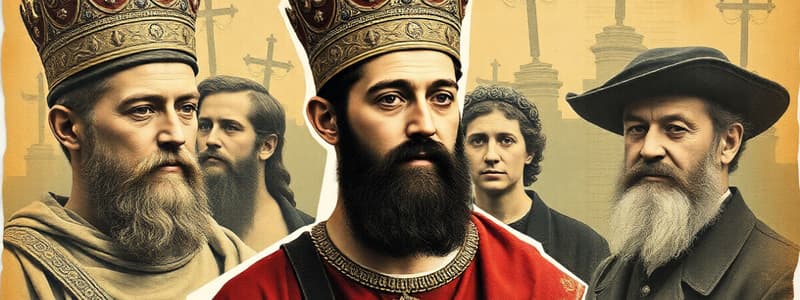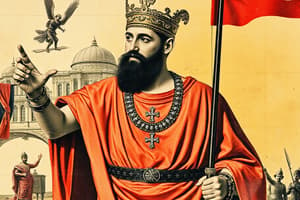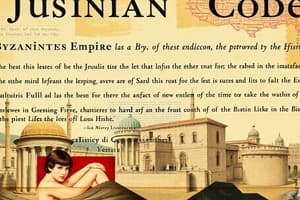Podcast
Questions and Answers
What was one of the significant accomplishments of Justinian that Procopius praised?
What was one of the significant accomplishments of Justinian that Procopius praised?
- The reconstruction of the Hagia Sophia (correct)
- Abolishing slavery
- Expanding the empire through peaceful treaties
- The establishment of a democracy
Procopius consistently praised Justinian in all of his writings.
Procopius consistently praised Justinian in all of his writings.
False (B)
What influence did Empress Theodora have during Justinian's reign?
What influence did Empress Theodora have during Justinian's reign?
She influenced his decisions with her advice and persuasion.
Justinian's legal reforms are gathered in a collection known as ______.
Justinian's legal reforms are gathered in a collection known as ______.
Match the works of Procopius with their focus:
Match the works of Procopius with their focus:
Why is Justinian's Code considered historically significant?
Why is Justinian's Code considered historically significant?
What was one of Justinian's main goals as described by Procopius?
What was one of Justinian's main goals as described by Procopius?
What title is Justinian I most commonly known by?
What title is Justinian I most commonly known by?
Justinian I ruled the Byzantine Empire from 527 to 565.
Justinian I ruled the Byzantine Empire from 527 to 565.
What major architectural achievement is Justinian I known for?
What major architectural achievement is Justinian I known for?
Justinian I helped create a legal code known as the __________.
Justinian I helped create a legal code known as the __________.
Which of the following territories did Justinian I successfully regain during his reign?
Which of the following territories did Justinian I successfully regain during his reign?
Justinian I was universally praised and had no critics.
Justinian I was universally praised and had no critics.
What role did Justinian I play in the restoration of the Byzantine Empire's beauty?
What role did Justinian I play in the restoration of the Byzantine Empire's beauty?
Match the following achievements or characteristics with Justinian I's contributions:
Match the following achievements or characteristics with Justinian I's contributions:
Flashcards
Who was Justinian I?
Who was Justinian I?
Justinian I ruled the Byzantine Empire from 527 to 565, during a period of great turmoil and rebuilding.
How did Justinian expand the Byzantine Empire?
How did Justinian expand the Byzantine Empire?
He was known for expanding the Byzantine Empire to its greatest size in history. He regained lost territories in Italy, Spain, and North Africa.
What did Justinian do for Constantinople?
What did Justinian do for Constantinople?
Justinian rebuilt Constantinople with new harbors, bridges, aqueducts, public buildings, and churches.
What is the Hagia Sophia?
What is the Hagia Sophia?
Signup and view all the flashcards
How did Justinian support art?
How did Justinian support art?
Signup and view all the flashcards
What is the Justinian Code?
What is the Justinian Code?
Signup and view all the flashcards
How was the Justinian Code organized?
How was the Justinian Code organized?
Signup and view all the flashcards
What is the Institutes of Justinian?
What is the Institutes of Justinian?
Signup and view all the flashcards
What was Justinian's Code?
What was Justinian's Code?
Signup and view all the flashcards
Why was Justinian's Code important?
Why was Justinian's Code important?
Signup and view all the flashcards
Why is Justinian's Code historically significant?
Why is Justinian's Code historically significant?
Signup and view all the flashcards
Who was Procopius?
Who was Procopius?
Signup and view all the flashcards
What is 'The Secret History'?
What is 'The Secret History'?
Signup and view all the flashcards
Why is Procopius's writing valuable?
Why is Procopius's writing valuable?
Signup and view all the flashcards
Who was Empress Theodora?
Who was Empress Theodora?
Signup and view all the flashcards
Study Notes
Justinian I: A Complex Ruler
- Justinian I (527-565 CE) ruled the Byzantine Empire, a time of significant upheaval. His reign was marked by both praise and criticism.
- He expanded the empire to its greatest extent by reclaiming territories lost in the Western Roman Empire, including parts of Italy, Spain, and North Africa.
- Justinian oversaw the rebuilding of Constantinople, including new infrastructure like harbors, bridges, aqueducts, and public buildings (e.g., Hagia Sophia).
- He commissioned artistic endeavors such as paintings and sculptures. A notable achievement was the creation of the Codex Justinianus, a collection of legal codes that became a cornerstone of law in numerous nations.
- This code consolidated and updated previous Roman laws; aiming to streamline and improve upon outdated laws and add new ones.
- Despite his achievements, Justinian faced accusations of tyranny.
Primary Sources on Justinian
- Procopius, a military advisor and historian, wrote extensively about Justinian's reign. Early works praised Justinian's accomplishments, particularly regarding architecture, military success and law.
- Procopius's Secret History, written later in his life and published posthumously, presents a sharp contrast, criticizing Justinian's policies and methods as tyrannical.
- The Secret History criticizes Justinian's ambition, alleged cruelty and control of the people and the empire.
- The book also contained criticisms of Empress Theodora.
- The Secret History suggests that Justinian's focus was on personal gain and power, not the welfare of the people.
- The differing perspectives in Procopius's works highlight the conflicting viewpoints of the time regarding Justinian's rule.
Justinian and Empress Theodora
- Visual depictions (e.g. portraits) of Justinian and Theodora showcase their relationship.
- Theodora exerted significant influence on Justinian's decisions.
- Some accounts suggest Justinian's accomplishments diminished after Theodora's death.
- These images reveal aspects of their personalities and relationship that written accounts might not.
Evaluating Justinian's Legacy
- Determining Justinian's true character requires analyzing multiple sources and acknowledging the bias of each.
- Procopius' changing perspective, from praise to condemnation, provides valuable insight, but the objectivity of his account should be scrutinized.
- Beyond written accounts, additional sources, like art, architecture, and historical records from the time, would provide a richer understanding of Justinian's legacy.
Studying That Suits You
Use AI to generate personalized quizzes and flashcards to suit your learning preferences.




